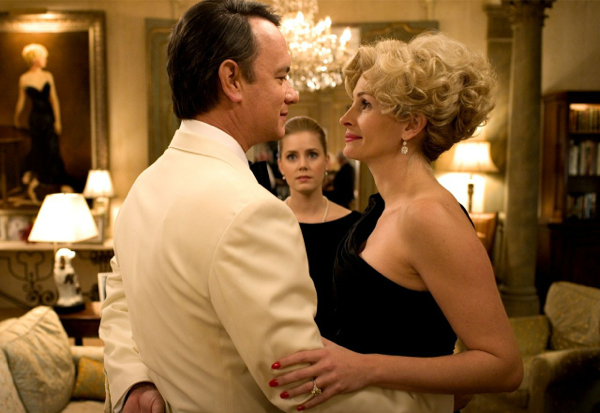Movie review by Greg Carlson
A nimble blend of politics, sex, and modern history, “Charlie Wilson’s War” is ten times more fun than a cinematic civics lesson ought to be. With Mike Nichols behind the camera and Aaron Sorkin at the typewriter, the movie’s liberal disposition will surprise nobody, but the film contains a tacit approval of hawkishness that lends the enterprise a sobering subtext. Conservatives will seethe at the suggestion that clandestine, Reagan-era armament of Afghan Mujahideen set the table for the Taliban and the rise of terrorism perpetrated by Islamic extremists, but the filmmakers are not afraid to connect the dots provided by George Crile’s 2003 book “Charlie Wilson’s War: The Extraordinary Story of the Largest Covert Operation in History.”
With its trio of Academy Award winning performers in starring roles, “Charlie Wilson’s War” might have easily been a bloated prestige picture designed to reel in trophies even as it put audiences to sleep. Fortunately, Nichols and Sorkin streamline the source material into an aerodynamic bullet train, and the movie’s 97-minute running time turns out to be one of the film’s biggest assets. Nichols also understands better than nearly any director that a spoonful of comedy helps the political exposition go down, and makes certain to skirt didacticism whenever satire and farce will do.
Stepping into the shoes of the Texas Congressman known as “Good Time Charlie,” Tom Hanks works his self-deprecating charm into overdrive, emphasizing Wilson’s predilections for whiskey and women without losing sight of the man’s keen interest in world affairs. Wilson’s very friendly relationship with Houston socialite Joanne Herring (embodied seductively by Julia Roberts), involves him in the anti-Soviet cause, and in a blink, he’s helped appropriate substantial piles of cash to provide anti-tank and surface-to-air missiles to fighters in Afghanistan. Aiding and abetting Wilson is surly C.I.A. operative Gust Avrakotos (Philip Seymour Hoffman), whose rapid comebacks and quicksilver wit perfectly complement his intense expertise and unwillingness to suffer fools.
Sorkin has honed his ability to balance bleak, darkly comic cynicism with I-told-you-so piety, and his screenplay demonstrates the best example yet. The dialogue is so crisp and sharp, it makes you wish people were able to speak with such consistent bite in the real world. Sorkin has a knack for both illuminating and simplifying the messed-up ironies inherent in the U.S. political machine, and once the dust begins to settle, the audience shares Wilson’s indignation at the refusal of his colleagues to spend a measly million dollars to finance schools in Afghanistan after the tide has turned against the Soviet Union.
Of course, the idea that Wilson was able to get everything done with a wink and a drink plants “Charlie Wilson’s War” firmly in the tradition of Frank Capra’s Capitol Hill fantasies. This breezy approach enhances rather than diminishes the movie’s sparkle, except in the few instances when the filmmakers opt for seriousness. Scenes in which villages are strafed by U.S.S.R. attack helicopters feel out of place, especially when Nichols takes us into the cockpits for some subtitled gallows humor. Minor complaints like this, however, can scarcely stand in the way of the movie’s grand old time.
